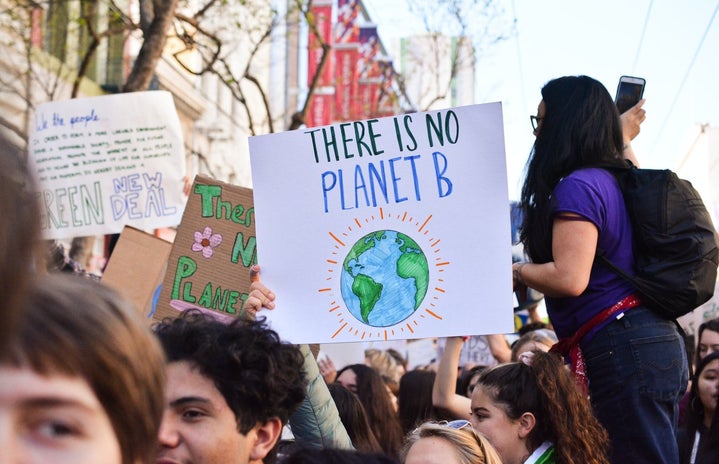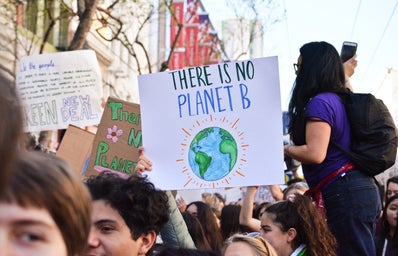When most people consider female environmentalists of the 21st century, Greta Thunberg—an 18-year-old Swedish activist—almost immediately comes to mind. Although Thunberg’s youth and her proud identification with Aspergers make her distinct from past environmentalists, her international recognition maintains the general trend of white activists acting as the face of environmental sustainability. The lack of intersection in environmentalism helps to harmfully uphold the white savior complex and is detrimental to handling global warming in a holistic manner, as climate change primarily impacts communities of color.
Unfortunately, the environmental movement largely excludes many influential BIPOC activists who are paving the way for grassroots change and serving as a voice for communities that are often silenced by scientists, politicians, and corporations. However, BIPOC voices of the environmental movement must be amplified in order to understand the intersectionality of climate change’s effects on communities throughout the world. This Women’s History Month, here are a handful of the many BIPOC women who deserve recognition and praise for their environmental stewardship.

- Autumn Peltier @autumn.peltier
-
Peltier is a member of the Wikwemkong First Nation and is a “water warrior.” As the Chief Water Commissioner for Anishinabeck Nation, Peltier has advocated for clean water in First Nations communities throughout Canada since the age of 14. She spoke at the United Nations in 2018 and 2019 to share the cultural importance of water and discuss the critical implications of deforestation, droughts, and flooding. Peltier has fought to ban plastics and to increase environmentally sustainable practices throughout the world.
- Savonala “Savi” Horne
-
Horne is the Executive Director of the Land Loss Prevention Project which offers legal, technical, and economical assistance towards Black farmers in North Carolina. Many Black American farmers face land loss due to legal and economic discrimination which is a massive issue. To learn more about discrimination in the American agriculture industry, I recommend The New York Times’ 1619 podcast’s two episodes titled; “The Land of Our Fathers” as a starting point.
- Isra Hirsi @israhirsi
-
At the mere age of 16, Hirsi co-founded the nationwide U.S. Youth Climate Strike which aims to demand comprehensive climate policy through protest. As a Black Muslim woman, Hirsi is passionate about intersectionality in all spheres of activism, from environmental justice to gun control. She seeks to diversify the environmental movement, believing that the roots of global warming coincide with racial injustice claiming; “The climate crisis is lives, it’s liberation.” Along with her own budding career in activism, Hirsi is the daughter of renowned U.S. Representative Ilhan Omar.
- Leah Namungerwa @namugerwaleah
-
Ugandan activist Leah Namugerwa strikes from school every Friday with Greta Thunberg’s #FridaysForFuture to demand environmentally sustainable solutions to the climate crisis. Namungerwa’s urge to protest was motivated by environmental degradation in Uganda; with a drought causing the agricultural industry to fail, leading to a rise in hunger. This crisis has been kept under wraps by the media, with Namugerwa asserting that “The silence on environmental injustice seems to be intentional.” Droughts take a massive toll on a nation’s economy as well; in the span of one year, damage resulting from a drought would cost an estimated 7.5% of Uganda’s GDP. Namugerwa hopes to inspire legislation and to increase the public’s attention surrounding climate change.
- Xiye Bastida @xiyebeara
-
Bastida is a passionate climate activist originating from Mexico. She is part of the Otomi-Toltec indigenous peoples and is currently based in New York City. Bastida is involved in a myriad of environmental organizations, such as the Sunrise Movement and Extinction Rebellion. She is also a coordinator for the Re-Earth Initiative, helped to lead the organization of Fridays For Future, and is part of the administrative committee for Peoples Climate Movement. Bastida is passionate about involving youth in the fight against climate change and has developed activist training programs, organized a plethora of climate strikes, and is an environmental advocate; speaking at various rallies, town halls, and at the United Nations.

BIPOC women are truly leading the battle against climate change from a community-based, politically oriented, and scientifically as well as culturally significant perspective. This list of activists at the forefront of the environmental movement is truly inexhaustible. I encourage everyone to ensure that your environmental sustainability is intersectional and uplifts the experiences of communities throughout the globe.
Can’t get enough of HC UMass Amherst? Be sure to follow us on Instagram, listen to us on Spotify, like us on Facebook, and read our latest Tweets!


